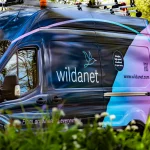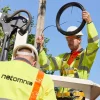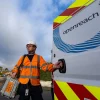Openreach Consult UK ISPs on WLR Telephone Network Closure
Openreach (BT) has this week announced that they will next month begin consulting UK ISPs on the process and timeline for withdrawing their Wholesale Line Rental (WLR) service by 2025, which underpins a lot of traditional copper telephone lines (PSTN / POTS).
At this point it becomes important to distinguish between the phone / voice side of that service and the physical copper line underneath. BT has long spoken of their desire to migrate users off their traditional phone (PSTN) network (here) and switch them to IP-based voice services (e.g. VoIP). We touched on this subject again last year as part of our article – ‘The Changing Face of UK Home Phone Lines and Broadband Provision‘.
Crucially this doesn’t mean that they’re going to completely remove the copper lines, not least because new hybrid fibre (part fibre) broadband technologies like G.fast will continue to use some copper for awhile. Indeed it will still be a couple of decades before every line is truly fibre optic. At present Openreach only aspires to reach 10 million premises with “full fibre” lines by around 2025 and even that is far from being a done deal (here).
Advertisement
As part of this Openreach has also indicated that they’d like the ability to migrate consumers from copper to Fibre-to-the-Premises (FTTP) lines as the service is deployed (here), although Ofcom will need to agree such a move and that’s a complicated problem for the regulator. A lot of ISPs have investments in the copper network and consumers will also need to adapt (different service, higher cost etc.).
Meanwhile copper phone lines are changing. The forthcoming adoption of new services, such as Single Order Generic Ethernet Access (SOGEA and SOGfast), will make it possible for consumers to order a copper-based standalone FTTC (VDSL2) or G.fast broadband line without the phone / voice service, although the latter could be optionally added later via VoIP.
Naturally “full fibre” FTTP lines can’t use the old telephone network and so they’ll also harness IP based calling, where required.
An Openreach Spokesman said (The Register):
“In May [2018], we’ll consult with industry around the process of withdrawing WLR and related products.
This follows plans by BT to upgrade its customers from analogue (PSTN) to digital (all IP) telephone services by 2025.
We’ll be working with our Communication Provider customers over the coming months as we consider the move to IP voice services – where broadband rather than voice becomes the primary service.”
Openreach has uploaded a short briefing on the consultation here, although history tells us that finding an agreement in a lake of so many competing interests could be difficult. Nevertheless traditional phone services are on their way out and even Ofcom recognises that broad direction of travel.
Advertisement
One key point to make here, in case there’s any confusion, is that the withdrawal of WLR / PSTN doesn’t mean that line rental will become free. The phone / voice component of a copper line is only a tiny part of the total cost and many people will still need the same physical copper line for their broadband, at least until FTTP but that carries a premium of its own.
Mark is a professional technology writer, IT consultant and computer engineer from Dorset (England), he also founded ISPreview in 1999 and enjoys analysing the latest telecoms and broadband developments. Find me on X (Twitter), Mastodon, Facebook, BlueSky, Threads.net and Linkedin.
« 10000 Premises in Cleckheaton Set for Virgin Media UK Broadband
















































Comments are closed